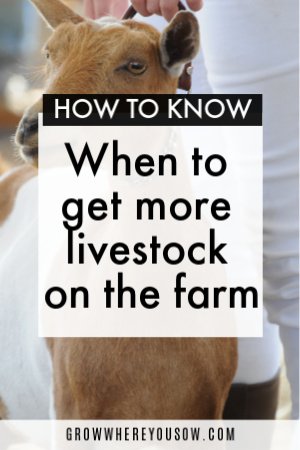When to get more livestock
I’ve decided there’s really no absolutely perfect time to add more livestock to your homestead. There are a few things you can do to become more comfortable with the choice you make. These are in no particular order!

Table of contents
When’s the right time for new livestock on your farm?
Space for your livestock
One of the most important parts of adding livestock to your homestead is making sure you have space for them. You want to make sure that your animal will have a clean place to sleep and a way to keep their food and water containers away from contamination. Each animal requires a different amount of space, so do your research to make sure you prevent overcrowding.
Livestock housing
Have your housing prepared and ready before bringing home your new livestock animal addition. This tip I give from past experience! Some animals don’t need much. For example, at the bare minimum, all a pig needs is a 3 walled shelter with a slanted roof so they have the option to get away from the elements.
Your chickens need a hen house to roost and lay eggs and, in some areas, an enclosed coop to keep your chooks away from predators and/or out of the neighbor’s yard. You’ll experience the stress of your life bringing home new livestock with no plan for housing. Also, would you want to be brought to a new “home” where there’s nowhere for you to actually stay?
Expenses
This is a huge one. How much is your new livestock going to cost you? You’d be amazed how much information you can find on how much it costs to raise an animal. You should go to your feed stores (yes, all of them) and compare prices. We have Tractor Supply, Rural King, and a couple of local, small-business feed stores in my area.
Before I decide to purchase a new animal I go to each store with a notepad and write down the prices of all the materials I’ll need for that type of livestock. These materials include, but aren’t limited to, your daily feed, medications, and even how much things like feeding troughs will cost you.
Keep in mind that your “start-up” expenses are just as important to know as your daily expenses are. By doing this, you can get a good idea of where you’ll be getting your materials from and how much it’s going to run you.
Knowledge
How much do you know about your livestock animal of interest? Recently we got a pig (read about it here and here) and it was really a spur of the moment endeavor. Someone offered us a 3-month-old pig and I was absolutely not ready in many ways.
Luckily, I had the housing and lot for her because the previous owners of our land also had farm animals. Within one week, I learned more about pigs than I ever thought I’d know.
My days were filled with reading about different breeds, how to feed a pig, how pigs act, how to butcher a pig, etc. After doing my research, I felt so much more comfortable with our decision to say “Yes” to the offer.
You need to know the sicknesses your animals can get and how to treat them. How quickly is your animal expected to grow? What foods should and shouldn’t you feed your animal?
Prepare and inform yourself about what you’ll be doing with things like their old bedding and waste (composting it usually works!). Also, know how much of a time commitment is required for the new livestock of choice. For example, pigs require more work than chickens, in my experience.
Accessories
I mentioned this earlier, and it really falls under the topic of housing, but I want to talk more about it. What I mean by accessories are things like your watering trough, feed pans, wallows/pools, salt blocks, roosts, laying boxes, etc.
You don’t want to feed your livestock animals (or any animal for that matter) on the ground, so be sure to have a clean container to eat their meals from.
All livestock requires clean, fresh water at all times no matter the animal. Water troughs would be an accessory you want to have prepared before getting home.
Your Reasoning
Finally, why are you purchasing this livestock animal?
- Food or friend? Deciding on this before bringing an animal home will make it so much easier to stick to your decision.
- Is your reasoning the same as the others involved? If no, try to come to some agreement to reduce stress.
- Breeding to sell or breeding for personal use/consumption? I’ve only bred rabbits and chickens for personal use/consumption, but imagine things would be done differently if I were to sell my meat.
Getting new livestock on the farm
You can’t completely prepare yourself when it comes to a new addition on the homestead. Each animal is totally different and will present you with their own obstacles, good or bad.
My first-time goat experience probably won’t be the same as yours and vice versa. We can only do our very best to prepare, and after that, we’re along for the ride! Good luck!


Great advice! We are guilty of bringing home animals without being as prepared as we needed to be—mostly from inexperience and just not knowing. You’re right about the stress of having to “hurry up” and get things done! 🙂 Pinned this morning, and then I saw this on the hop! 🙂
Thanks, Heidi! I’ve definitely brought chicks home once before without being prepared, but it taught me my lesson. I don’t do well with the last minute stuff it turns out! To each their own, it’s a no judgment zone on this website, thanks for stopping by!
Great tips! Thanks for sharing on To Grandma’s House We Go!
Thanks, Chas!